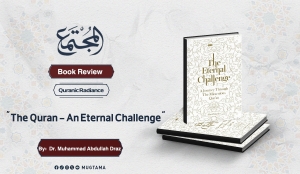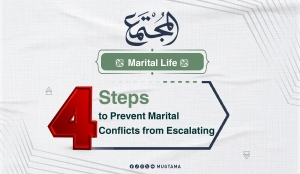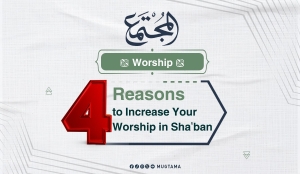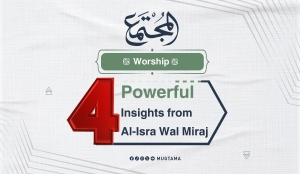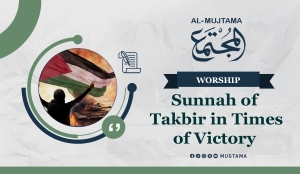Tasneem
5 Bright Proofs of Islam’s Honor for Women
February 17, 2025
An incessant clamor of Westerners and secularists persists as they hurl accusations at Islam, particularly regarding women: “Islam oppresses women!” “Oh, the poor woman! Islam wants to erase her identity and suppress her!” “You seek to cover women and consider them a source of shame—how barbaric!”
Yet, here stands a Christian woman—an outspoken critic of Islam—who, in an interview with British journalist Dilly Hussain, expressed her frustration over the increasing number of young people and women embracing Islam. She lamented: “The Western women are meeting these Muslim men. These Muslim men are saying to these western women. ‘You are so precious. You are so important. I want no one to look upon your beauty other than me and Allah’… The natural instinct for a woman is to find a man that is going to be protective.”
This, she admitted, aligns with a woman’s natural instinct—her innate desire to have a man who protects and cherishes her.
Similarly, social media influencer Veronika Edali acknowledged that Islam is the fastest-growing religion globally, particularly among women. One of the primary reasons for her conversion was Islam’s gender equality. She dismissed the false narrative that women in Islam are oppressed, stating that while researching women's rights before embracing Islam, she was “enlightened by how much Islam values and honors and respects and elevates women.” This ultimately led her to accept Islam, as she had always been a strong advocator for gender equality.
There are countless other Western women who have willingly embraced Islam after discovering the peace, dignity, and rights it guarantees them—rights that secularism and capitalism failed to provide. Instead, these ideologies relentlessly promote female nudity and moral decay under the guise of “freedom,” a hollow concept that has led to the disintegration of families, the collapse of societies, and the rise of crime, murder, and rape!
Where is the freedom in that? How can they condemn Islam, which honored women and granted them unimaginable rights?
Some Aspects of Islam Honoring Women:
- The Right to Life: Before Islam, pre-Islamic Arabs oppressed women and even buried their daughters alive. Islam completely forbade this practice. Allah says, “And when the girl [who was] buried alive is asked. For what sin she was killed.” (At-Takwir 8-9)
Women in ancient civilizations also lived in oppression and humiliation. In Greek society, philosophers deemed women inherently inferior and impure. In Roman civilization, women were treated as mere commodities, bought and sold in marketplaces. In England, they were auctioned like livestock, and in France, they were seen as beings created solely for men’s service. Meanwhile, Judaism labeled women as the root of sin and misfortune. - Freedom and the Right to Choose: Women cannot be forced into marriage; their consent is essential. The Prophet ﷺ said: “A previously married woman should not be married until her permission has been sought, and a virgin should not be married until her consent is sought.” (Sahih al-Bukhari, 5136)
Islam also did not prohibit women from working or engaging in trade. The best example is Khadijah bint Khuwaylid, the wife of the Prophet ﷺ, who was a successful businesswoman. Furthermore, Islam upheld women’s right to education. The Prophet ﷺ dedicated a special day to teach women, as reported by Abu Sa'id al-Khudri: “Some women requested the Prophet (ﷺ) to fix a day for them as the men were taking all his time. On that he promised them one day for religious lessons and commandments.” (Sahih al-Bukhari, 101) - Obligated Men to Provide for Women: A woman’s guardian is responsible for her financial needs from birth until death. Allah says, “Men are in charge of women by [right of] what Allah has given one over the other and what they spend [for maintenance] from their wealth.” (An-Nisa: 34) Islam even forbade taking women’s wealth forcefully or against her will: “O you who have believed, it is not lawful for you to inherit women by compulsion. And do not make difficulties for them in order to take [back] part of what you gave them unless they commit a clear immorality.” (An-Nisa: 19) Rather, her financial maintenance is given precedence even over that of the parents, as Sheikh Ibn Uthaymeen (may Allah have mercy on him) said: “The correct view is that one begins with himself, then his wife, then his child, then his parents, and then the rest of his relatives.” Unlike pre-Islamic Arabia, where women had no inheritance rights and were treated as property, Islam granted them a share of inheritance and treated them with dignity: “For men is a share of what the parents and close relatives leave, and for women is a share of what the parents and close relatives leave, be it little or much - an obligatory share.” (An-Nisa: 7)
- Protected Women and Prohibited Harming Them:
Islam legislated the hijab as a means of safeguarding women’s dignity and shielding them from harm. Allah says, “O Prophet, tell your wives and your daughters and the women of the believers to bring down over themselves [part] of their outer garments. That is more suitable that they will be known and not be abused. And ever is Allah Forgiving and Merciful.” (Al-Ahzab: 59)
Islam also prohibited a woman from traveling without a mahram to ensure her safety, even for Hajj. The Prophet ﷺ said: “It is not lawful for a woman believing in Allah and the Hereafter to undertake journey extending over a day and a night except when there is a Mahram with her.” (Sahih al-Bukhari, 1088) Furthermore, Islam forbade keeping a woman in a marriage against her will to harm her:
“And do not keep them, intending harm, to transgress [against them]. And whoever does that has certainly wronged himself.” (Al-Baqarah: 231)
Unlike men, women are not obligated to engage in combat, as jihad requires physical endurance that contradicts their nature. However, Islam equated for them Hajj and Umrah with jihad in reward. ‘A’isha said that she asked God’s messenger whether jihad was incumbent on women, and he replied, “Yes, jihad which does not include fighting is incumbent on them. It is the hajj and the ‘umra.” (Ibn Majah, 2901)
Even those who fail to uphold women’s rights will be held accountable. The Prophet ﷺ said: “O Allah, bear witness that I have issued a warning concerning (failure to fulfill) the rights of the two weak ones: Orphans and women.” (Sunan Ibn Majah, 3678) - Kindness and Patience Toward Women: Islam commanded men to treat women with kindness: “And live with them in kindness. For if you dislike them - perhaps you dislike a thing and Allah makes therein much good.” (An-Nisa: 19) Islam also emphasized caring for widows, likening it to striving in Allah’s cause, so they won’t suffer from the pain of losing their husbands and striving for their livelihood. The Prophet (ﷺ) said: “The one who looks after and works for a widow and for a poor person, is like a warrior fighting for Allah's Cause or like a person who fasts during the day and prays all the night.” (Sahih al-Bukhari, 5353)
Moreover, Islam abolished pre-Islamic and Jewish practices of shunning women during menstruation. The Prophet ﷺ lived with his wives normally while they were menstruating, only avoiding sexual intercourse. He also commanded patience, kindness and good treatment with women, recognizing their emotional nature. He said: “Treat women nicely, for a women is created from a rib, and the most curved portion of the rib is its upper portion, so, if you should try to straighten it, it will break, but if you leave it as it is, it will remain crooked. So treat women nicely.” (Sahih al-Bukhari, 3331)
This is merely a glimpse of Islam’s extensive rights and honors for women. Do not be deceived by the distortion campaigns and false claims of the misguided in the name of false freedom. For, there is no freedom like the freedom of Islam, and no justice like the justice of Islam!
-----------------------------------------------------------
- Encyclopedia of the Merits of Islam.
- The Status of Women in Islam by Dr. Muhammad bin Maq'ad Al-Asimi.
- Bloodxbrothers, Why Are White Women Converting to Islam?
- Veronika Edali, Why So Many Women Convert to Islam.
- Al-Jazeera.net
- IslamWeb.
8 Drives to Love and Care for the Needy
February 14, 2025
The poor and the needy share characteristics of weakness, humility, and the inability to earn enough to meet their essential needs. When either term is mentioned independently, it implies both of them together. However, when mentioned together, each term has a distinct meaning despite their shared characteristics of need and vulnerability. The difference is that the poor are financially destitute and have no wealth whatsoever, while the needy may have some wealth, but it is insufficient to fulfill their needs and may also be internally humble and have a rich heart.
Islam invites believers to love the needy, whether this refers to financial hardship or inner emotional vulnerability. This is evidenced by the fact that the Prophet (peace and blessings be upon him) prayed to Allah to make him live as a needy, even though he sought refuge from poverty, which supports the view that the need primarily pertains to the heart rather than material conditions, although it does not exclude them.
Manifestations of Loving the Needy
- Respect and Appreciation: By showing true brotherhood in interactions and refraining from contempt or belittling them.
- Support and Assistance: By providing for their essential needs without causing harm or boasting about one's generosity.
- Accompanying and Engaging with Them: By visiting, interacting, and involving them in suitable tasks.
Motivations for Loving and Helping the Needy
- Worshiping Allah
Allah commanded benevolence towards the needy. He says, “Worship Allah and associate nothing with Him, and to parents do good, and to relatives, orphans, and the needy.” (An-Nisa: 36) Allah also said: “And give the relative his right, and [also] the poor.” (Al-Isra: 26) Additionally, Allah commanded the Prophet (peace and blessings be upon him) to treat the needy with love and kindness. In Musnad Ahmad, Abu Dharr al-Ghifari narrated: “My most beloved person- the Prophet – may peace and blessings of Allah be upon him- ordered me to love the poor and be close with them.” Meaning to keep the needy in one’s consideration, loving them, being near them, checking on their conditions, striving to meet their needs, and safeguarding their interests to alleviate their hardship and share their burdens.
- Following the Example of the Prophet
The Prophet (peace and blessings be upon him) loved the needy and openly declared this to the people. Allah even commanded him to pray for this, as mentioned in Sunan at-Tirmidhi, where Ibn Abbas reported that the Messenger of Allah (peace and blessings be upon him) said: “I saw my Lord tonight in the most beautiful form. He addressed me by name, and said, when you pray, say: 'O God, I ask Thee for power to do good things and abandon objectionable things, for love towards the poor.'” Thus, the Prophet (peace and blessings be upon him) would supplicate for Allah to grant him a life and death among the needy and to be resurrected with them on the Day of Judgment.
- Embodiment of Noble Ethical Values
Loving the needy nurtures numerous ethical values promoted by Islam, as it requires a Muslim to empathize with, be compassionate toward, and assist the needy. It is a noble act that represents the true spirit of human values at their finest.
- Fostering Societal Cohesion
The needy are part of society, just like anyone else. They need support and inclusion. Without this, they may become sources of harm or resentment. When love and kindness prevail, such negativity is eliminated, fostering societal cohesion and building strong relationships based on respect and appreciation.
- Encouragement to Show Gratitude for Blessings
In Sunan Ibn Majah, authenticated by Al-Albani, Abu Hurairah reported that the Messenger of Allah (peace and blessings be upon him) said: “Look to one who is lower than you, and do not look to one who is above you. For indeed that is more worthy (so that you will) not belittle Allah's favors upon you.” Reflecting on the needy and the blessings they lost motivates one to remember these blessings and be grateful for them, which leads Allah to increase His bounty, as He says, “And [remember] when your Lord proclaimed, 'If you are grateful, I will surely increase you [in favor].'” (Ibrahim: 7)
- Protection from Allah’s Punishment
Allah has warned of severe punishment for those who neglect the needy. He described one of the reasons for entering Hell Fire, saying: “Nor did he encourage the feeding of the poor.” (Al-Haqqah: 34) The people of Hell admitted their neglect by saying as mentioned in the Quran: “Nor did we used to feed the poor.” (Al-Muddathir: 44)
- Closeness to Allah on the Day of Resurrection
In Sunan at-Tirmidhi, authenticated by Al-Albani, Anas reported that the Messenger of Allah (peace and blessings be upon him) said: “O 'Aishah! Love the needy and be near them, for indeed Allah will make you near on the Day of Judgement.”
- Being Among the Righteous
Allah described the righteous inhabitants of Paradise as those who perform specific deeds, including feeding the poor and those in need. He says, “And they give food in spite of love for it to the needy, the orphan, and the captive, [saying], 'We feed you only for the countenance of Allah. We wish not from you reward or gratitude. Indeed, We fear from our Lord a Day austere and distressful.' So Allah will protect them from the evil of that Day and give them radiance and happiness, and will reward them for what they patiently endured with a garden [in Paradise] and silk [garments].” (Al-Insan: 8-12)
Therefore, Al-Bukhari narrated that Nafi' said: “Ibn `Umar never used to take his meal unless a poor man was called to eat with him.” The Prophet (peace and blessings be upon him) also prohibited feeding the needy with food that people would not desire. In Musnad Ahmad, Aisha (may Allah be pleased with her) narrated: “A lizard was brought to Allah's Messenger (ﷺ) but he neither ate that nor did he prohibit it. I said, 'Shall we not give it to the poor?' He said, 'Do not feed them what you do not eat yourselves.'”
-------------------------------------------------------------
The book The Quran - An Eternal Challenge by Dr. Muhammad Abdullah Draz is one of the most significant contemporary works written to elucidate the miraculous nature of the Qur'an. The author discusses the thematic unity of Qur'anic Surahs and provides evidence and arguments to prove that each Surah of the Qur'an resembles a cohesive structure. The book is divided as follows:
First Chapter: Definition of the Qur'an and the Difference Between It and Other Sacred Qudsi and Prophetic Hadiths: The author explains the linguistic and etymological meanings of “Qur'an” and “Al-Kitab (the Book),” the secret behind their names, and why the Qur'an is uniquely preserved and immune to distortion among the revealed scriptures.
Second Chapter: Proving the Divine Origin of the Qur'an: This chapter establishes that the Qur'an is from Allah, citing as evidence Allah's reproaches of Prophet Muhammad (peace be upon him) in permissible matters and mentioning the testimony of polytheists who acknowledged the Prophet's truthfulness in both speech and action.
In this chapter, the author outlines four stages:
Stage One: Refuting the claim that the Qur'an is Muhammad's own speech, emphasizing that the meanings of the Qur'an are beyond human intelligence and deduction, and inaccessible except through divine revelation. Examples include the detailed stories of the prophets and the people of the cave.
Stage Two: Denying the existence of any human teacher for Muhammad (peace be upon him).
Stage Three: Highlighting the phenomenon of divine revelation and its indication of the Qur'an’s source.
Stage Four: The essence of the Qur'an reveals its divine origin, addressing three aspects of its miraculous nature: linguistic, scientific, and legislative, while responding to misconceptions about the linguistic miracle of the Qur'an.
The author concludes the book with a model study of the Qur'anic miracle for Surat Al-Baqarah, dividing his analysis into an introduction, four main objectives, and a conclusion as follows:
- Introduction: Defining the Qur'an and highlighting its guidance.
- First Objective: Inviting all people to Islam.
- Second Objective: Specifically inviting the People of the Book to abandon falsehood and embrace the true religion. This section spans around 123 ayahs and includes mentions of the Israelites with Musa, their salvation from Pharaoh and the sea, their repentance being accepted, the trial of Ibrahim with commandments, his building of the Ka'bah with Ismail, the command to change the direction of prayer toward the Sacred House, and the mention of Al-Safa and Al-Marwah.
- Third Objective: Detailed presentation of the laws of Islam in 106 ayahs, covering matters such as patience in adversity and hardship, rulings on fighting in the Sacred Mosque, and family matters like divorce, khul' (the separation of the wife in return for a payment), maintenance, and similar issues.
- Fourth Objective: Emphasizing the religious motivation to adhere to these laws and mentioning the truths of faith and Islam.
- Conclusion: Introducing those who responded to this comprehensive call, as mentioned in the last two ayahs of Surat Al-Baqarah.
-------------------------------------------------------------
4 Steps to Prevent Marital Conflicts from Escalating
February 13, 2025Conflicts between spouses often escalate when negative emotions accumulate, and one feels unappreciated or misunderstood by the other. This can turn disagreements into arguments or even estrangement, sometimes leading to separation and divorce.
Allah says, “And of His signs is that He created for you from yourselves mates that you may find tranquillity in them; and He placed between you affection and mercy. Indeed in that are signs for a people who give thought.” (Ar-Rum: 21)
Commentators explain that “affection” refers to intimacy, while “mercy” refers to children. Others interpret it as the mutual kindness and compassion between spouses. Ibn Abbas said: “Affection is a man’s love for his wife, and mercy is his kindness toward her, protecting her from harm.”
Wisdom dictates that men should take the initiative in resolving conflicts, preventing problems from escalating. He should remind his wife of Allah, their bond of affection and mercy, and listen to her until she has vented her sadness or anger, which often drives her toward emotional reactions and disputes.
Family experts recommend following four key steps to prevent marital conflicts from intensifying and to maintain harmony within the Muslim household:
1. Avoid Bringing Up the Past
Bringing up past incidents and using them against your spouse complicates discussions and hinders understanding. It may also prompt the other party to retaliate in the same way, recalling unrelated past grievances, which only deepens the divide between them and distracts from resolving the present issue.
This mistake is a primary cause of escalating conflicts, as it revives past negative emotions, leading to accumulated frustration. Instead, both spouses should focus solely on the current issue and work toward a solution without deviating from it.
2. Listen to Your Spouse
Give your spouse the opportunity to speak and express their feelings, especially the wife. Let her talk without interruptions. Simply listening attentively can resolve a significant part of the issue. A calm approach improves the atmosphere of discussion and increases the chances of resolving the conflict. The key is to make your spouse feel heard, understood, and respected.
Through this approach, a husband plants the seeds of resolution, gives himself a chance to process what happened, and might even come up with immediate solutions. Additionally, a wife may feel emotionally relieved after expressing herself, knowing that her husband listened without reacting angrily. Once she has spoken, the discussion can move toward finding a solution and fully resolving the conflict.
3. Avoid Trying to ‘Win’ the Argument
A marital disagreement is not a battlefield between two enemies. Instead, remember the bond of affection and mercy that unites you. The goal should be to contain the issue and understand each other’s needs within a constructive discussion that leads to solutions rather than disputes, estrangement, or even divorce.
Some people raise their voices to dominate the conversation or to end it on their terms. Others resort to threats, which only worsen the situation and diminish any chances of understanding. Worse still, such arguments might be overheard by neighbors or relatives. Instead, view discussions as opportunities to exchange ideas, voice concerns, ask questions, and propose solutions—without the need for one side to “win.”
4. Keep Your Goal in Mind: Resolving the Issue
Your ultimate objective should be resolving the conflict, whether through a kind word, a gentle touch, or acknowledging a suggestion from your spouse. Even if you propose a solution, do not dismiss her ideas entirely or belittle her contributions. Reassure her that you are working toward a solution together, and consider all possibilities, including her suggestions. If necessary, take time to reflect on an idea or seek advice from an expert. This approach demonstrates respect for her feelings and gives both of you the opportunity to address the issue effectively.
We find in the Prophet ﷺ the best example of handling conflicts with wisdom and patience. An incident illustrates his calm approach to dealing with the anger of Lady Aisha (may Allah be pleased with her).
Narrated An-Nu'man ibn Bashir: When AbuBakr asked the permission of the Prophet (ﷺ) to come in, he heard Aisha speaking in a loud voice. So when he entered, he caught hold of her in order to slap her, and said: Do I see you raising your voice to the Messenger of Allah? The Prophet (ﷺ) began to prevent him and AbuBakr went out angry. The Prophet (ﷺ) said when AbuBakr went out: You see I rescued you from the man. AbuBakr waited for some days, then asked permission of the Messenger of Allah (ﷺ) to enter, and found that they had made peace with each other. He said to them: Bring me into your peace as you brought me into your war. The Prophet (ﷺ) said: We have done so: we have done so. (Reported by Abu Dawood)
-------------------------------------------------------------
8 Proofs That Kindness Strengthens Leadership
February 13, 2025When people hear the word “custodian,” their minds immediately turn to rulers and heads of state. This is correct, but the mistake lies in limiting the meaning to state leaders alone. A custodian is anyone entrusted with the duty of care and governance, (1) regardless of what that duty entails. Thus, the term “custodian” is a general one that includes anyone responsible for managing an affair or carrying out a task.
Al-Bukhari narrated from Abdullah ibn Umar said: I heard Allah's Messenger (ﷺ) saying, “Everyone of you is a guardian, and responsible for what is in his custody. The ruler is a guardian of his subjects and responsible for them; a husband is a guardian of his family and is responsible for it; a lady is a guardian of her husband's house and is responsible for it, and a servant is a guardian of his master's property and is responsible for it.” I heard that from Allah's Messenger (ﷺ) and I think that the Prophet (ﷺ) also said, “A man is a guardian of is father's property and is responsible for it, so all of you are guardians and responsible for your wards and things under your care.”
Being responsible for one’s flock does not mean using force or harshness. Rather, it requires kindness and mercy. Several factors encourage gentleness toward those under one’s care, including:
1. Allah Commands Gentleness and Loves Those Who Practice It
Allah says, “So by mercy from Allah, [O Muhammad], you were lenient with them. And if you had been rude [in speech] and harsh in heart, they would have disbanded from about you. So pardon them and ask forgiveness for them and consult them in the matter. (Aal ‘Imran: 159) And when Allah sent Musa and Harun to Pharaoh, He commanded: “Go, both of you, to Pharaoh. Indeed, he has transgressed. And speak to him with gentle speech that perhaps he may be reminded or fear [Allah].” (Taha: 43-44)
Al-Bukhari narrated from Aisha that the Messenger of Allah (ﷺ) said: “Allah is Forbearer and loves forbearance in all matters.” When Umar ibn al-Khattab wanted to advise his governors, he said: “O shepherds! The people have rights over you. Know that nothing is more beloved to Allah and more honorable than the patience and gentleness of a leader.” (2)
Umar ibn Abdul Aziz said: “The most beloved things to Allah are four: moderation in wealth, forgiveness when able, patience in anger, and kindness to Allah’s servants in all circumstances.” (3)
2. The Prophet (ﷺ) Emphasized That Gentleness Beautifies All Affairs
Al-Bukhari narrated from Aisha that the Messenger of Allah (ﷺ) said: “Easy, 'A'isha, you must be gentle. Beware of harshness and coarseness.” And Muslim narrated from Aisha that the Prophet (ﷺ) said: “Kindness is not to be found in anything but that it adds to its beauty and it is not withdrawn from anything but it makes it defective.”
One example of his gentleness is what Al-Bukhari narrated from Anas ibn Malik, who said: “Once the Prophet (ﷺ) was on one of his journeys, and the driver of the camels started chanting (to let the camels go fast). The Prophet (ﷺ) said to him. “(Take care) Drive slowly with the glass vessels, O Anjasha! Waihaka (May Allah be Merciful to you).” (Meaning: the women.)
3. Whoever is Gentle, Allah Will Be Gentle With Him, and Whoever is Harsh, Allah Will Be Harsh With Him
Muslim narrated from Aisha that the Prophet (ﷺ) said: “O God, cause distress to him who has any charge over my people and causes them distress, and be gentle to him who has any charge over my people and is gentle to them.”
4. Kindness Towards People Is a Sign of a Good Leader
At-Tirmidhi narrated, with a chain authenticated by Al-Albani, from Abu Darda that the Prophet (ﷺ) said: “Whoever has been given his portion of compassion has been given his portion of good. Whoever is denied given his portion of compassion has been denied his portion of good.” Muslim narrated from Jarir ibn Abdullah that the Messenger of Allah (ﷺ) said: “He who is deprived of tenderly feelings is in fact deprived of good and he who is deprived of tenderly feelings is in fact deprived of good.”
In Musnad Ahmad, it is narrated from Aisha that the Messenger of Allah (ﷺ) said to her: “O Aisha, show gentleness, for when Allah intends good for a household, He guides them to gentleness.”
On the other hand, unjustified harshness and severity indicate that the leader is among the worst of people. This is evident in what Muslim narrated: 'Aidh bin 'Amr (May Allah be pleased with him) reported: I visited 'Ubaidullah bin Ziyad (he was unjust ruler) and said to him: “Dear son, I heard Messenger of Allah (ﷺ) saying, 'The worst of rulers are those who treat their subjects harshly. Beware, lest you should be one of them.'”
The term “hutama” (harsh leaders) used in the hadith is an exaggerated form, referring to those who crush everything beneath them—just as a shepherd who harshly drives his flock with a staff, scaring and hurting them. Similarly, a leader who rules with oppression and cruelty, scattering his people, falls under this category.
5. Gentleness Is a Sign of Wisdom and Understanding
Waki’ and Hannad narrated in Az-Zuhd that Abu Darda said: “Among the signs of a man’s wisdom is his gentleness in his livelihood.” And Hisham ibn Urwah reported from his father that it was written in wisdom:
“Gentleness is the pinnacle of wisdom.”
6. Gentleness Is a Form of Goodness Towards the People
Abu al-Qasim al-Maliki narrated in Ash-Shuhub al-Lami'ah Fis-Siyasah An-Nafi'ah that the people once complained about a governor to the caliph. One of them, Sahl ibn Asim, said to the caliph: Nothing to be complained in your governor except that Allah commanded two things: He implemented one and neglected the other. Allah says, “Indeed, Allah orders justice and good conduct.” He implements justice among us but neglects kindness. Justice without kindness ruins the people. (4)
7. Avoiding Harshness Saves from Allah’s Curse and Hellfire
Muslim narrated in his Sahih that Hisham ibn Hakim ibn Hizam happened to pass by people, the farmers of Syria, who had been made to stand in the sun. He said: What is the matter with them? They said: They have been detained for Jizya. Thereupon Hisham said: I bear testimony to the fact that I heard Allah's Messenger (ﷺ) as saying: “Allah would torment those who torment people in the world.”
Al-Hakim narrated from Aisha that the Messenger of Allah (ﷺ) said: “May Allah curse who rules with tyranny to exalt him whom God has humbled and humble him whom God has exalted.”
8. Gentleness Leads to Paradise
Muslim narrated in his Sahih that 'Iyad bin Himar (May Allah be pleased with him) reported: Messenger of Allah (ﷺ) said, “The people of Jannah will be of three kinds: A just successful ruler, a man who shows mercy to his relatives, and a pious believer who has a large family and refrains from begging.”
Waki’ narrated in Az-Zuhd with a sound chain from Qais ibn Abi Hazim, who said: It used to be said: “Whoever practices gentleness in this world will benefit from it in the Hereafter.”
-------------------------------------------------------------
1. Al-Mu'jam Al-Wasit: Academy of the Arabic Language (1/356).
2. Ihya Ulum al-Din: Al-Ghazali (3/188).
3. Bahjat Al Majalis: Al-Qurṭubi, p. 200.
4. Ash-Shuhub al-Lami'ah Fis-Siyasah An-Nafi'ah: Abu Al-Qasim Al-Maliki, p. 313.
A true believer's creed is built upon knowledge of Allah's Most Beautiful Names and Supreme Attributes. The believer contemplates these names with a reflective mind and a reverent heart. One of the key foundations of this creed is identifying what is affirmed and what is denied for Allah. This understanding elevates the believer to the highest levels of monotheism, attributing to Allah all attributes of perfection and majesty befitting His greatness while absolving Him of all deficiencies and flaws.
Affirmed Attributions for Allah
Taking a Khalil (Intimate Friend)
Allah, the Most High, took Prophet Ibrahim (peace be upon him) as an intimate friend, which is a distinguished status indicating supreme love and special favor. Allah said, “And Allah took Abraham as an intimate friend.” (An-Nisa: 125) Ibrahim (peace be upon him) achieved this high status, which is the pinnacle of love, due to his abundant acts of obedience, adherence to Allah’s commands, and avoidance of His prohibitions.
This ayah indicates Allah's selection of Ibrahim as His intimate friend and underscores the obligation to follow his creed. Since Ibrahim held this exalted position before Allah as His chosen friend, it is befitting that his creed and path be followed. Allah bestowed upon Ibrahim a pure nature, correct belief, sound reasoning, spiritual purity, perfect knowledge of Allah, resolute determination, and high ambition in opposing idolatry and polytheism. He became one of the messengers of Ulul Azm (with strong heart and patience), the intimate friend of Allah, and the enemy of Shaitan. (1)
Thus, Allah tested Ibrahim with a trial unlike any other, given his elevated status and honor. Ibn Al-Qayyim said: “Since intimate friendship is a rank that does not accept sharing, Allah the Almighty tested Ibrahim with the command to sacrifice his son, as the son had occupied a part of Ibrahim’s heart. Allah intended to purify that part solely for Him. The test was not about physically slaughtering the son but removing him from the heart. When they both submitted to Allah's command, and Ibrahim placed Allah's love above love for his son, the rank of intimacy was fully established, and the son was ransomed with a great sacrifice.” (2)
This distinguished status was not exclusive to Ibrahim, as Prophet Muhammad (peace and blessings be upon him) shared it. Jundub ibn Abdullah Al-Bajali (may Allah be pleased with him) reported: “I heard the Prophet (peace and blessings be upon him) say: 'Allah has taken me as His friend, as he took Ibrahim as His friend.'” (Sahih Muslim)
2- Taking Martyrs
Martyrdom is a high rank and a great privilege granted by Allah to whomever He chooses among His servants. Allah confirmed its greatness through this ayah: “And so that Allah may make evident those who believe and [may] take to Himself from among you martyrs.” (Aal Imran: 140)
The martyr is one who is killed in the path of Allah from among the believers. It has been said that the martyr is called so because Allah bears witness to his place in Paradise. Due to their immense virtue, Allah takes martyrs, which implies drawing them closer to His side as a mark of distinction and elevation of their rank. (3)
Allah calls upon martyrs for a practical demonstration of the testimony that none is worthy of worship except Allah. They affirm that the revelation they received from Him is the truth, and they believed in it, elevating His word by sacrificing everything for it. Their jihad involves establishing truth, eradicating falsehood from people's lives, and implementing Allah’s guidance on earth. This also entails exclusively following Muhammad (peace and blessings be upon him) and not relying on any other source for guidance.
Denied Attributions for Allah
1- Taking a Wife
“There is nothing like unto Him, and He is the Hearing, the Seeing.” (Ash-Shura: 11) Allah, the Most High, is far from any resemblance to His creation. He has negated taking a wife for Himself. He said, “And [it teaches] that exalted is the nobleness of our Lord; He has not taken a wife or a son.” (Al-Jinn: 3)
At-Tabari said in his commentary of this ayah: “The meaning is that His majesty, dominion, and immense power are so great that He does not need a wife or a son. A wife is only sought by someone weak and needy, driven by desire. A son results from a compelling desire that necessitates procreation.” (4) Allah is far above all of this. Blessed and exalted He beyond all imperfections
2- Taking a Son
Many polytheists, Jews, and Christians have falsely attributed offspring to Allah. They claimed that Christ is the son of Allah, Uzair is the son of Allah, and the angels are the daughters of Allah! Allah is far above their fabrications and false interpretations. “Allah is exalted beyond taking a son, as He is free from need. Taking a son implies dependence, but Allah is self-sufficient and in need of no one. Whatever He wills, He brings into existence merely by willing it, not through a son or any intermediary.” (5)
Allah said, “And it is not appropriate for the Most Merciful that He should take a son.” (Maryam: 92) Al-Qurtubi commented on this ayah: “He is self-sufficient and in need of no one. He is the Sovereign, and everything else is His possession. He is the Ever-Living who does not die. He is the Inheritor who remains. Exalted and glorified is our Lord beyond all that.” (6)
3- Taking a Supporter or Helper
Allah has also negated taking any supporter or helper. He said: “I did not make them witness to the creation of the heavens and the earth or to the creation of themselves, and I would not have taken the misguiders as assistants.” (Al-Kahf: 51) Allah the Almighty negates seeking assistance from devils or disbelievers in the act of creation. He did not involve them or make them witness the creation of even a part of themselves. Allah created everything independently without need for any helper or supporter. “If they were not partners in creation, why do you then take them as partners in worship? The right to be worshipped follows from the act of creation.” (7)
Allah also said, “And they do not have therein any partnership [with Him], nor is there for Him from among them any assistant.” (Saba: 22)
This means that Allah has no helper in creating anything. Allah is the sole Creator and thus the only One worthy of worship. The “partner” refers to someone who provides assistance and support, but no one assists or supports Allah. They are all His subjugated servants, under His majesty and power. (8)
Whoever attributes to Allah what does not befit His supreme attributes has associated others with Him, affirming for Allah what is unbefitting for His perfect and majestic qualities.
----------------------------------------------------------------
- Tafsir Modoee Encyclopedia.
- Al-Kashaf, Al-Zamakhshari, 1/569.
- Rawdat Al-Muhibbeen, 1/48.
- Al-Jami' li-Ahkam Al-Qur'an, Al-Qurtubi, 4/218.
- Jami' Al-Bayan, 9/330.
- Tafsir Al-Karim Al-Rahman, Al-Sa'di, p. 493.
- Al-Jami' li-Ahkam Al-Qur'an, Al-Qurtubi, 11/158.
- Mahamis Al-Ta'weel, Al-Qasimi, 7/42.
- Al-Jami' li-Ahkam Al-Qur'an, Al-Qurtubi, 14/295.
4 Reasons to Increase Your Worship in Sha'ban
February 09, 2025
A Muslim experiences different times in life that require serious reflection to take advantage of their blessings. Among these are the seasons of worship that come upon us, awaiting those who know how to make the best of them by drawing closer to Allah and earning His pleasure. Worship is the means through which the soul is disciplined, refined, and elevated above whims, desires, and doubts.
When speaking of preparation and training, there is no better time than the month of Sha'ban to train properly and prepare to win the rewards of the greatest of months—Ramadan. Whoever neglects Sha'ban may miss out on much during Ramadan due to lacking the spiritual readiness to receive this blessed month.
Every action a person goes through in life requires preparation, especially matters related to their worldly affairs. So how much more important is it to prepare for the matters of the Hereafter, which are far more significant? There are always motivators in life that drive us to perform certain tasks and take the initiative. Among these are the reasons that should urge us to make the most of Sha'ban by increasing our acts of worship and devotion:
- The Raising of Deeds to Allah:
Allah has made Sha'ban the month in which all deeds for the entire past year are presented to Him. As mentioned in the hadith, “…It is a month in which the deeds are taken up to the Lord of the worlds, and I like that my deeds be taken up when I am fasting.” Thus, Sha'ban serves as the closing season for your annual record of deeds. Imagine the angels ascending with the harvest of an entire year of your work to present it to the Lord of the Worlds.
- Reviving the Neglected Seasons:
The Prophet ﷺ explained the reason for fasting more in Sha'ban than in other months, highlighting the extent of heedlessness that occurs in this month. Usama ibn Zaid reported that the Prophet ﷺ said, “That is a month to which people do not pay much attention, between Rajab and Ramadan.” People revere Ramadan for its rewards and virtues and honor Rajab due to its sacredness, but the Prophet ﷺ wanted to clarify the value of Sha'ban so people would not neglect it.
If we reflect, we will notice that most people use Sha'ban to rush and complete their worldly tasks in preparation for Ramadan, aiming to dedicate themselves fully to worship during it. This often transforms Sha'ban into a worldly-focused month, creating the intended heedlessness.
- Purity of the Heart:
During this month, there is a great night where Allah looks upon His servants and blesses them with His forgiveness, and His mercy descends upon them. Abu Musa Al-Ash'ari narrated that the Prophet ﷺ said, “God most high looks down on the middle night of Sha'ban and forgives all His creatures, except a polytheist or one who is hostile.” Is there any sane person who would pass up this immense reward available in Sha'ban?
- Preparation for Ramadan:
As is well-known, Sha'ban is a month of spiritual and moral preparation, a divine training period. Believers must be fully prepared and ready to preform worships to the best of their abilities during Ramadan. Therefore, one must make the necessary preparations in Sha'ban, such as reading, learning, and devising plans and arrangements to make the most of Ramadan. This enables one to reap the fruits of the seeds sown in Rajab, watered in Sha'ban, and harvested during Ramadan, achieving the desired reward by the end of the blessed month.
-------------------------------------------------------------
4 Powerful Insights from Al-Isra Wal Miraj
February 04, 2025The incident of Al Israa Wal Miraj has always been filled with important lessons that require extensive contemplation to deduce wisdom and understand Allah’s will for His servants through it. While it can be accepted that the event served as a form of solace for the soul of the Prophet, peace and blessings be upon him, it also included great rewards and introduced new concepts to the vocabulary of Muslims. It was not an ordinary event but rather a miraculous one that defied the natural laws and life concepts, thereby adding many notions that Muslims must comprehend and embrace with complete submission and conviction.
Upon reflecting on the events of this blessed divine night, one will find numerous lessons and insights that Muslims must pay close attention to. The significance of this event is highlighted by its mention in the Qur’an, where an entire surah was dedicated to discussing its details. From this standpoint, we aim to pause and reflect on this incident to highlight the lessons, insights, and meanings it imparted to Muslims. Among these lessons are:
1. A Gift Born from Hardship
The Prophet, peace and blessings be upon him, endured numerous significant hardships throughout his life. Among these was Quraysh's persistent obstruction of his call to Allah in Makkah, in Thaqif, and among many other Arab tribes, essentially besieging the call to Allah's religion. After the death of Abu Talib, who had protected the Prophet from Quraysh’s schemes, the Prophet, peace and blessings be upon him, found himself in grave danger. Then came the incident of Al-Isra Wal Miraj to console the Prophet amidst these mounting challenges. During this miraculous event, Allah gathered him with other prophets and messengers in a single meeting, appointing him as their leader and final prophet.
2. Purifying the Ranks Before Building the State
Given the accumulation of hardships in Makkah, the Prophet, peace and blessings be upon him, was on the brink of a new phase aimed at protecting Muslims from the persecution inflicted by Quraysh. All indications pointed toward migration as the beginning of a new chapter for the Muslim community. Therefore, before embarking on this journey and initiating the construction of the Islamic state, Allah willed that the foundational elements of this building be sound and free from any impurities, characterized by strength, cohesion, and unity. Hence, this event served as a test to filter out the weak, hesitant, and doubtful believers, affirming the sincere and steadfast ones.
3. Islam as the Religion of Human Nature
The incident where the Prophet, peace and blessings be upon him, was given the choice between drinking milk or wine symbolizes that Islam is the natural religion for all humanity. No other religion aligns harmoniously with human nature because the One who created this innate nature has ordained this religion as its guide and complement. Islam regulates the inclinations of the human self, fulfilling its needs while restraining its excesses.
4. Realizing the Importance of the Al-Aqsa Mosque
After the incident of Al-Isra Wal Miraj, the first generation of the Prophet's companions recognized their true responsibility toward the Al-Aqsa Mosque. Consequently, they moved swiftly to liberate it from Roman control during the caliphate of Umar ibn Al-Khattab, restoring peace and security to it for a long period. However, the Crusaders later wreaked havoc in it five centuries after the Prophet's migration. It was only when a leader who followed the path of the companions emerged, namely Salahuddin Al-Ayyubi, that the Muslims reclaimed and liberated it. This same lesson remains relevant, awaiting Muslims who will mimic the efforts of their predecessors in achieving liberation after periods of captivity and suffering.
-------------------------------------------------------------
Sunnah of Takbir in Times of Victory
February 03, 2025
The believers rejoice at Allah's victory, raising their voices with takbir (Allahu Akbar “Allah is the greatest”) as an expression of genuine happiness for Allah’s support of those striving in His cause. Various evidence confirms its permissibility, even recommending it, based on the actions of the Prophet ﷺ and his noble companions. Some examples include:
- The Prophet's Takbir Upon the Death of Abu Jahl in Badr:
The Prophet ﷺ said takbir when he learned about the killing of Abu Jahl during the Battle of Badr. Ahmad narrated in his Musnad from Ibn Mas'ud, who said: “I came to the Prophet ﷺ on the day of Badr and said, 'I have killed Abu Jahl.' He asked, 'By God than Whom there is no god' I replied, 'By Allah, God than Whom there is no god.' He repeated it three times, then said: 'Allahu Akbar! Praise be to Allah who has fulfilled His slave and defeated the confederates alone. Lead me to him.' We went to see him, and when the Prophet ﷺ saw his body, he said: 'This is the Pharaoh of this nation.'” - The Prophet’s Takbir Upon Victory in Khaybar:
The Prophet ﷺ announced his victory in the Battle of Khaybar by raising his voice in takbir out of joy and happiness. Al-Bukhari and Muslim narrated from Anas: “The Messenger of Allah (ﷺ) raided Khaibar. One morning we offered prayers in the darkness of early dawn (near Khaibar). Then the Messenger of Allah (ﷺ) mounted (his horse). Abu Talha mounted his and I mounted behind Abu Talha on the same horse. The Prophet of Allah (ﷺ) rode through the streets of Khaibar and (I rode so close to him) that my knee touched the thigh of the Prophet of Allah (ﷺ). The wrapper got aside from his thigh, and I could see its whiteness. When he entered the town, he said: God is Great. Khaibar shall face destruction. When we descend in the city-square of a people, it is a bad day for them who have been warned (and have not taken heed).” - The Prophet’s Takbir Rejoicing Over His Companions’ Victory Over Shaytan’s Whisperings:
Abu Dawud narrated in his Sunan from Ibn Abbas: “A man came to the Prophet (ﷺ) and said: Messenger of Allah! one of us has thoughts of such nature that he would rather be reduced to charcoal than speak about them. He said: Allah is Most Great, Allah is Most Great, Allah is Most Great. Praise be to Allah Who has reduced the guile of the devil to evil prompting.”
This hadith illustrates that some companions had some Shaytan’s whisperings but refrained from discussing them due to their strong faith, which delighted the Prophet ﷺ. - The Prophet’s Takbir Upon the Birth of Abdullah ibn Abi Talhah:
Ahmad narrated in his Musnad from Anas ibn Malik: “When Um Sulaim gave birth to a child, I carried him to the Prophet ﷺ and said, ‘O Messenger of Allah, Um Sulaim has given birth to a boy.’ He said, 'Allahu Akbar, what did she give birth to?' I replied, 'A boy.' He said, 'Praise be to Allah.' He then said, 'Bring him to me.' I handed him to the Prophet ﷺ, and he rubbed his palate with dates (tahnik).” - The Companions’ Takbir Upon the Prophet’s Glad Tidings of Paradise:
Al-Bukhari narrated from Abdullah ibn Mas'ud saying, “We were with the Prophet ﷺ, and he said: By Him in Whose Hands my life is, hope that you will be one-fourth of the people of Paradise. We shouted: Allahu Akbar! He added: I hope that you will be one-third of the people of Paradise. We shouted: Allahu Akbar! He said: I hope that you will be half of the people of Paradise. We shouted: Allahu Akbar!” - The Prophet’s Reception in Madinah During His Migration:
Ahmad narrated in his Musnad from Al-Bara' ibn ‘Azib regarding the migration: “Abu Bakr said: The The Messenger of Allah (ﷺ) and I continued on our way until we came to Madinah, where the people met him. They came out on the road and on the roofs, and a lot of servants and children crowded the road saying: Allahu Akbar, the Messenger of Allah (ﷺ) has come, Muhammad has come.” - Haram ibn Milhan’s Takbir Upon Being Fatally Stabbed:
Al-Bukhari narrated in his Sahih from Anas: “The Prophet (ﷺ) sent seventy men from the tribe of Bani Salim to the tribe of Bani Amir. When they reached there, my maternal uncle (Haram ibn Milhan) said to them, ‘I will go ahead of you, and if they allow me to convey the message of Allah's Messenger (ﷺ) (it will be all right); otherwise you will remain close to me.’ So he went ahead of them and the pagans granted him security But while he was reporting the message of the Prophet (ﷺ), they beckoned to one of their men who stabbed him to death. My maternal uncle said, ‘Allah is Greater! By the Lord of the Ka`ba, I am successful.’” - A Companion’s Takbir Upon Learning About Flexibility in Religious Matters:
Muslim in his Sahih and Abu Dawud (with the latter’s wording) narrated from Ghudayf ibn al-Harith: I asked Aisha: Have you seen the Messenger of Allah (ﷺ) washing (because of defilement) at the beginning of the night or at the end? She replied: Sometimes he would take a bath at the beginning of the night and sometimes at the end. Thereupon I exclaimed: Allah is most Great. All Praise be to Allah Who made this matter accommodative. I again asked her: What do you think, did the Messenger of Allah (ﷺ) say the witr prayer (additional prayer after obligatory prayer at night) in the beginning of the night or at the end? She replied: Sometimes he would say the witr prayer at the beginning of the night and sometimes at the end. I exclaimed: Allah is most Great. All praise be to Allah Who made the matter accommodative. Again I asked her: What do you think, did the Messenger of Allah (ﷺ) recite the Qur'an (in the prayer) loudly or softly? She replied: Sometimes he would recite loudly and sometimes softly. I exclaimed: Allah is most Great. All praise be to Allah Who made the matter flexible. - Uthman’s Takbir When Besieged, Bearing Testimony to the Prophet’s Glad Tidings of His Martyrdom:
At-Tirmidhi and An-Nasa'i (authenticated by Al-Albani) narrated from Thumamah bin Hazn Al-Qushairi: “I was present at the house when 'Uthman looked out over them and said: 'I adjure you by Allah and by Islam, are you aware that when the Messenger of Allah was atop Thabir -the Thabir in Makkah- and with him were Abu Bakr, 'Umar and myself, the mountain shook, and the Messenger of Allah kicked it with his foot and said: Be still, Thabir, for upon you are a Prophet, a Siddiq and two martyrs?' They said: 'By Allah, yes.' He said: 'Allahu Akbar! They have testified for me, by the Lord of the Ka'bah' -i.e., that I am a martyr.”
-------------------------------------------------------------
The Sacred Months: Allah’s Sanctity and Believer’s Duty
February 02, 2025
“Indeed, the number of months with Allah is twelve [lunar] months in the register of Allah [from] the day He created the heavens and the earth; of these, four are sacred.” (At-Tawbah: 36)
Allah created the earth and all that it encompasses, establishing a temporal system of twelve months, by which people manage their lives, in His decree on the day He created the heavens and the earth. Among these months, He designated four as sacred: Rajab, Dhul-Qa’dah, Dhul-Hijjah, and Muharram.
It is narrated from Abu Bakrah that the Prophet ﷺ said during his sermon in the Farewell Pilgrimage: “Time has completed a cycle to the form of the day when God created the heavens and the earth. The year contains twelve months of which four are sacred, three of them consecutive, viz. Dhul Qa'da, Dhul Hijja. and Muharram, and also Rajab of Mudar which comes between Jumada and Sha'ban.” (The month Rajab is here connected with the North Arabian tribe of Mudar because they are said to have honoured it greatly and never to have broken its sacred nature. The precise reference to its place among the months is said to be for the purpose of removing any doubt about it owing to the earlier practice of periodically intercalating a month). (Reported by Al-Bukhari and Muslim)
Regarding the wisdom behind the sanctity of these months, Ibn Kathir said: “The sacred months are four: three consecutive and one separate. This was due to the rituals of Hajj and Umrah. Allah made the month before the months of Hajj sacred, which is Dhul-Qa'dah, because they would sit [cease fighting] in it and prepare for Hajj without engaging in war. Dhul-Hijjah was made sacred because they perform the Hajj rituals and are occupied with completing its rites. Another month was made sacred after it, which is Muharram, so that they could return safely to their distant lands. Rajab was made sacred in the middle of the year for the purpose of visiting the House (Kaaba) and performing Umrah by those coming from the far corners of the Arabian Peninsula, so they could visit and return to their homeland safely.” (1)
The Status of the Sacred Months
In His divine wisdom, Allah has chosen specific times that He loves and honors above others. Suhayl ibn Abi Salih narrated from his father, who quoted Ka'b as saying: “Allah has chosen specific times, and the most beloved times to Allah are the Sacred Months, the most beloved of which is Dhul-Hijjah, and the most beloved part of Dhul-Hijjah is its first ten days.” (2) Allah commanded Muslims to revere these months as part of His sacred rituals: “That [has been commanded], and whoever honors the sacred ordinances of Allah - it is best for him in the sight of his Lord.” (Al-Hajj: 30)
The veneration of these months was not an innovation of Islam but was also practiced in the pre-Islamic era. Arabs refrained from warfare and acts of vengeance during these months. Ibn Kathir comments: “A man would encounter his father’s killer during the Sacred Months and not lay a hand on him.” (3)
The Arabs held the sacred months in such high regard that if they wanted to engage in urgent or necessary combat, they would postpone some of these months to avoid bloodshed during them. The Quran prohibited this practice, known as al-nasīʾ (postponing), as Allah says, “Indeed, the postponing [of restriction within sacred months] is an increase in disbelief by which those who have disbelieved are led [further] astray. They make it lawful one year and unlawful another year to correspond to the number made unlawful by Allah and [thus] make lawful what Allah has made unlawful. Made pleasing to them is the evil of their deeds; and Allah does not guide the disbelieving people.” (At-Tawbah: 37) In these sacred months, there are two types of sanctity: one for Allah the Almighty and another for the believer.
Sanctity for Allah
- Prohibition of warfare: Allah forbade all forms of fighting during these months, whether between Muslims or against disbelievers.
- Prohibition of injustice and aggression: Oppression is prohibited at all times but is especially grave during these sacred months. Allah says, “Indeed, the number of months with Allah is twelve [lunar] months in the register of Allah [from] the day He created the heavens and the earth; of these, four are sacred. That is the correct religion, so do not wrong yourselves during them.” (At-Tawbah: 36) Imam Ibn Ashur explains in his commentary: “The reason for the specific prohibition of sins during these months is that Allah made them times designated for worship. If one is not engaged in worship during these months, then at least they should not be involved in sin. This does not mean that sins are not prohibited at other times, but rather that sins during these months are more severe, and righteous deeds are rewarded more greatly. A similar example is Allah's saying: (There is no disobedience and no disputing during Hajj.) (Al-Baqarah: 197), as disobedience is prohibited both during Hajj and at other times.” (4)
3- Encouragement of good deeds: Acts such as prayer, fasting, charity, and Quran recitation are highly recommended during these months. Imam Qatadah states: “Good deeds are more rewarding during the Sacred Months, and wrongdoing is more severe during them, even though wrongdoing is always severe.” (5)
- Prohibition of hunting for the Muhrim in Hajj and Umrah: Allah says, “O you who have believed, do not kill game while you are in the state of ihram.” (Al-Maidah: 95)
Sanctity for the Muslim
- An Opportunity for Repentance and Seeking Forgiveness: During these months, there is an increase in reward and blessings, and righteous deeds performed by a Muslim are multiplied in reward. With Allah's vast mercy, especially during these blessed days, He accepts repentance. Therefore, this is a golden opportunity for many Muslims to start anew, striving for repentance and reform.
- An Opportunity to Strengthen Social Bonds: These months help in fostering social cohesion among Muslims, strengthening ties of brotherhood, solidarity, and kindness, maintaining family relationships, assisting the needy, giving abundant charity, and rejecting hatred and disputes among Muslims.
- A Reminder of the Importance of Peace: These months remind us of the importance of peace and harmony among people, as wars cease, hearts reconcile, and souls calm.
Importance of Prohibiting Warfare in the Sacred Months
The prohibition of fighting during the sacred months is one of the fundamental rulings brought by Islam, carrying profound wisdom and noble objectives. This wisdom is evident in several aspects:
- Preserving and Sanctifying Life: The prohibition of fighting during these months reflects Islam's reverence for human life, considering it a trust that must be safeguarded.
- Strengthening social bonds and uniting the Ummah, building trust among its members.
- Providing a Safe Environment for Hajj: By coinciding with some of these months, the prohibition of fighting ensures the safety and security of pilgrims during the Hajj season, safeguarding the sanctity of the Sacred Mosque.
- Affirming the Values of Peace: Islam is fundamentally a religion of peace, love, and strong bonds between people. Through this prohibition, Islam sends a clear message to the world that the objective of wars and conquests is to liberate humanity.
- Encouraging Dialogue: This ruling promotes dialogue and understanding, not as an alternative to warfare to raise the banner of Allah but as a complement to it. War is only permissible against aggressors.
- Focusing on Spiritual Aspects: This prohibition emphasizes devotion, increased acts of worship, and doing everything Allah loves. Worship includes refraining from actions that displease Allah. All this contributes significantly to refining, elevating, and purifying souls from hatred and grudges.
- A Divine Legislative Wisdom: Allah, in His infinite wisdom, has chosen these specific months, as He knows best what benefits His servants and the appropriate times and places for that benefit.
- Balancing Interests: This ruling achieves a general benefit for people by preserving security and stability.
The prohibition of fighting during the sacred months is a wise divine command aimed at protecting life, strengthening social ties, and providing a safe environment for worship. It is a testament to the greatness of Islam and its concern for humanitarian and ethical aspects. Now, as we witness the sacred months, let us seize this opportunity to benefit as much as possible.
-------------------------------------------------------------
(1) Tafsir Ibn Kathir (4/148).
(2) Lata’if al-Ma'arif by Ibn Rajab, p. 267.
(3) Tafsir Ibn Kathir (1/413).
(4) Tafsir Al-Qurtubi (8/134).
(5) Tafsir Al-Baghawi (3/345).



